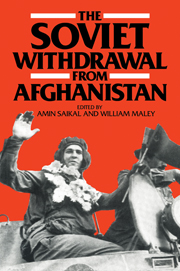Book contents
- Frontmatter
- Contents
- Preface
- 1 Introduction
- 2 The Geneva Accords of April 1988
- 3 Post-Withdrawal Afghanistan: Light at the End of the Tunnel
- 4 The Regional Politics of the Afghan Crisis
- 5 The Afghan Conflict and Soviet Domestic Politics
- 6 The Soviet Armed Forces and the Afghan War
- 7 Afghanistan and Soviet Alliances
- 8 Afghanistan and Sino-Soviet Relations
- 9 The Afghanistan 'Settlement' and the Future of World Politics
- 10 Conclusions: Management of the Afghan Crisis
- List of Contributors
- Index
1 - Introduction
Published online by Cambridge University Press: 09 November 2009
- Frontmatter
- Contents
- Preface
- 1 Introduction
- 2 The Geneva Accords of April 1988
- 3 Post-Withdrawal Afghanistan: Light at the End of the Tunnel
- 4 The Regional Politics of the Afghan Crisis
- 5 The Afghan Conflict and Soviet Domestic Politics
- 6 The Soviet Armed Forces and the Afghan War
- 7 Afghanistan and Soviet Alliances
- 8 Afghanistan and Sino-Soviet Relations
- 9 The Afghanistan 'Settlement' and the Future of World Politics
- 10 Conclusions: Management of the Afghan Crisis
- List of Contributors
- Index
Summary
After nearly a decade of bloodshed and political turmoil following the Soviet invasion of Afghanistan in late December 1979, the withdrawal of Soviet combat forces from Afghanistan brings to an end the only episode of sustained foreign occupation in the country's modern history. The introduction of Soviet forces en masse resulted not simply in an unprecedented trauma for Afghanistan, but in a regional and global crisis which in a very real sense snuffed out the détente between the Superpowers which had developed in fits and starts from at least the late 1960s. An end to the Soviet involvement in Afghanistan is a momentous development on two different levels. The people of Afghanistan have borne the brunt of Soviet military activities, and an evacuation of Soviet troops is for them an occurrence of singular importance. But they are by no means the only actors to have felt the impact of the war. Other regional states have been forced to adjust to the Soviet presence, and this has influenced their domestic political structures and their relations with each other. The Soviet Union has been affected in manifold ways. And even at the global level, the Afghan crisis has impinged on the international relations of the USSR. The purpose of this book is to examine the more important consequences of Soviet withdrawal from Afghanistan.
The Geneva Accords on Afghanistan of 14 April 1988, concluded under the auspices of the United Nations between the Soviet-backed communist regime of the People's Democratic Party of Afghanistan (PDPA) and the Government of Pakistan, and jointly guaranteed by the Soviet Union and the United States, provided the overall framework for the Soviet withdrawal.
- Type
- Chapter
- Information
- The Soviet Withdrawal from Afghanistan , pp. 1 - 11Publisher: Cambridge University PressPrint publication year: 1989



